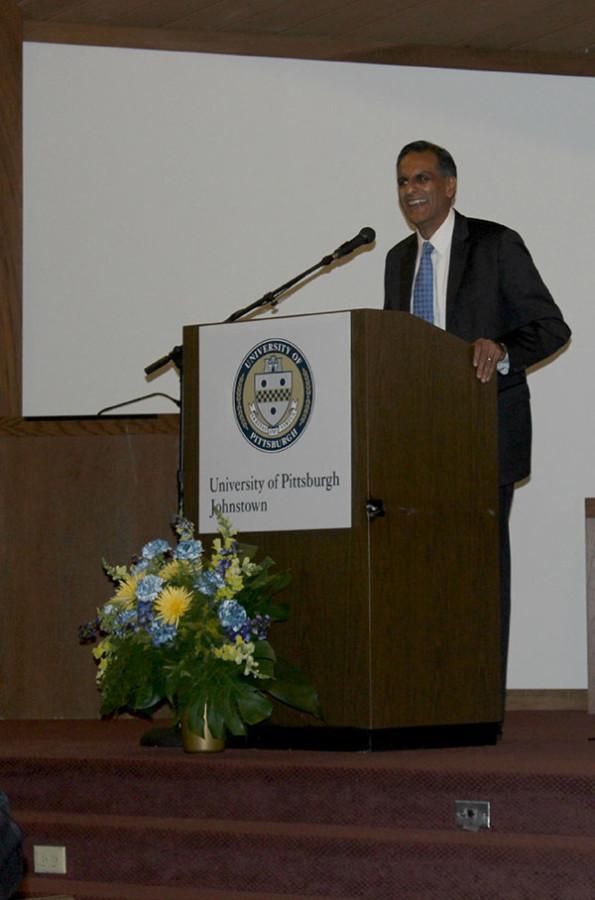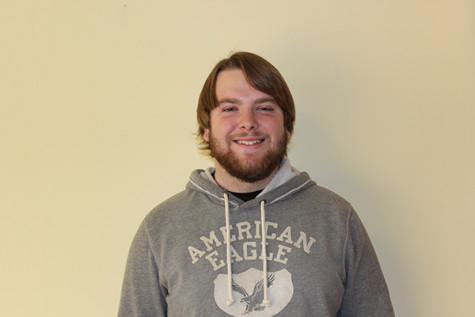Ambassador to India returns to the area
U.S. Ambassador to India, Richard Verma, speaks to a crowd of over 170 people at Whalley Memorial Chapel.
September 30, 2015
In front of more than 170 people Sept. 23, inside Pitt-Johnstown’s Whalley Memorial Chapel, University President Jem Spectar presented U.S. Ambassador to India and former Johnstown resident, Richard Verma with the President’s Medal of Distinctive Excellence.
“The medal recognizes exceptional persons for exemplary contributions toward making our world a better place,” Spectar said.
Spectar said the medal is the highest award given by Pitt-Johnstown.
“Richard was chosen for a wide range of criteria including social, cultural and humanitarian contributions to the community of humankind,” he said.
Verma, 46, came not only to be honored by university officials but also to discuss Indian politics.
India now is the second most populous country in the world and is projected to surpass China’s population by the next decade.
Verma also has served as Assistant Secretary of State and is a former Pitt-Johnstown Advisory Board member.
Verma was confirmed as ambassador to India in December 2014. He then moved to New Delhi in January with his family.
Verma said he had to get used to using social media as a platform for politicians to get in touch with the public.
“I had not used social media before until I got to New Delhi,” Verma said.
“(Twitter) is a great place to get to know the world and is a very honest place as well.”
Verma said people will often tell him things on social media that he does not want to hear.
“There was a person that wrote to me on Twitter recently saying, ‘This is all very interesting, but when are you actually going to do some work?’” Verma said.
According to Verma, India has the largest United States embassy that is not in a war zone country or territory.
Verma explained what an ambassador does when there isn’t external conflict going on, with or without the United States.
Verma provided examples of bringing people closer together in India.
“I was able to take 10 Indian naval aviators with me to the USS Carl Vincent (an American aircraft carrier) to spend a day talking about military operations with American aviators,” he said.
Verma then brought up Western Pennsylvania’s hospitality and proclaimed what he thought made the region great.
“If you don’t hear it enough, let me say it to you now,” Verma said.
“This (Western Pennsylvania) is a different place. The values here are different. There is a real sense of teamwork here and taking care of each other that doesn’t necessarily exist in other parts of the country.”
Verma is son of former Pitt-Johnstown English professor Kamal Verma.
Verma’s father was a university faculty member for over four decades, according to Pitt-Johnstown’s website.
He specialized in post-colonial and Indian literature and retired two years ago.
“My father arrived in New York City with a bus ticket and $24 in his pocket,” Verma said.
“He told this story so much that our family got tired of hearing it.”
Verma said his father told his mother that he would be back home after one year, so he could receive a master’s degree at the University of Northern Iowa.
He has been in America ever since.
He did so well while getting his master’s degree, that he was suggested to obtain a doctorate right after, according to Verma.
Verma’s mother is another example of an Indian-American success story as well.
She became a special-needs school teacher and a social worker not only in the United States, but in Canada, too.
Verma’s parents’ coming-to-America stories made him question whether he could have done same thing.
“It was an uncertain time to say the least, but my parents doubled down and worked awfully hard,” he said.
“An image of my mother with a sari on, standing at the bus stop in snow is an image that sticks in my head. It makes me question whether I could have gone through the same things my parents did.”


